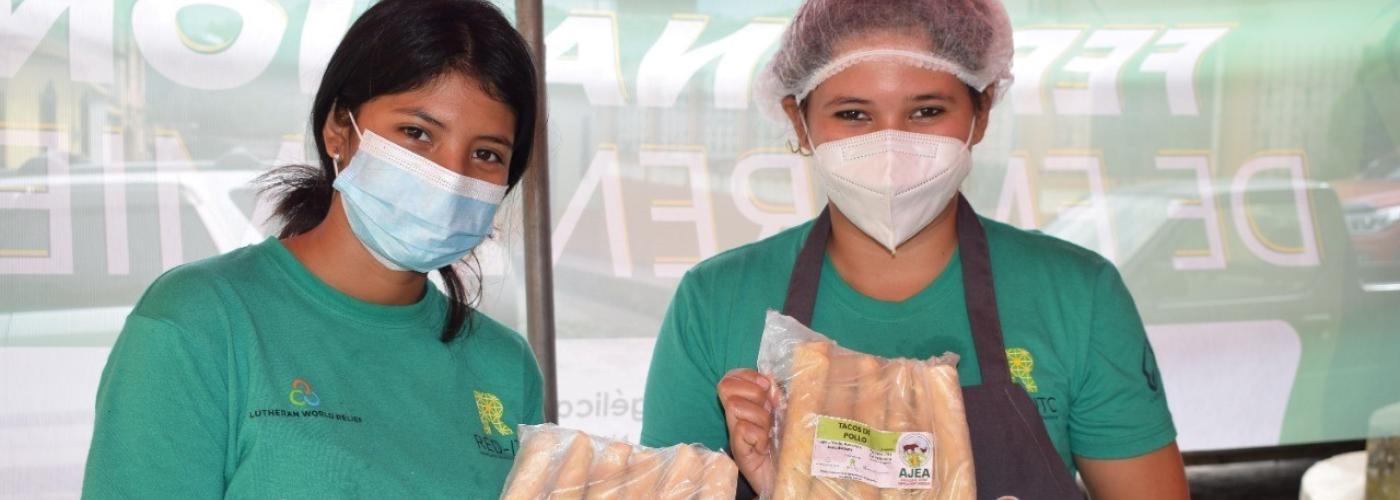Opening doors for Honduran youth: supporting new agribusiness ventures
Image

Climate change and food insecurity are severely impacting rural livelihoods in Honduras and increasing rates of migration out of the country. With more than 28% of youth not in education, employment or training, too many Honduran young women and men face dismal economic prospects. Lutheran World Relief is committed to building the next generation’s hope for a stable and prosperous life within Honduras.
To address gaps in youth employment in rural Honduras, Corus International organization Lutheran World Relief is strengthening youth technical capacities required to enter labor markets and increasing access to environmentally sustainable employment. In collaboration with local partner Red de Institutos Tecnicos Comunitarios (Red ITC) through the Youth in Agribusiness: Ensuring the Employment of Tomorrow project, we emphasize climate change adaption while improving income and job opportunities in the agricultural sector for youth within Honduras’ Dry Corridor.
By helping youth entrepreneurs realize their potential through new agribusiness ventures, we are addressing one of the root causes of migration – youth unemployment and underemployment.
ENSURING THE EMPLOYMENT OF TOMORROW
Since 2019, the Youth in Agribusiness project has transformed the reality of young people with few opportunities in western Honduras by linking them to education, internships and vocational training. To date, more than 90 youth have received technical and agriculture training to meet market demand. Training has included climate change responsiveness, technology utilization, water and soil management, and specialized trade skills in coffee roasting, horticulture, meat processing and fish farming, among others. Youth have implemented 17 local environmental action plans in partnership with municipal environmental offices.
The project engages directly with the Honduran private sector to connect young people to formal employment. More than 40 youth, 40% of whom are women, have been linked to formal job opportunities. Eighty young people were also trained in business development and are organized into 20 collective enterprises across six value chains: beekeeping, coffee, dairy, poultry, fish and sweets.
The youth-led coffee microenterprise PROJADEG (Guisayote Coffee Processing Company of Youth Entrepreneurs) has already roasted 2,000 pounds of coffee and marketed more than 600 pounds of coffee of its own brand, earning a gross income of over $3,000.
Andrea Aguilar Ramirez, a 19-year-old Honduran coffee farmer in the project and president of PROJADEG, is hopeful for the future, “Through Lutheran World Relief’s Youth in Agribusiness project, our microenterprise received financial support, equipment and training in good agricultural practices increasing our sales and the services we offer.” Furthermore, Andrea and her fellow entrepreneurs are thinking critically about the environmental impact of the coffee sector, “Sustainability of the coffee sector means that coffee can be cultivated in a way that takes care of the environment by using proper agricultural practices while at the same time coffee producers can achieve better livelihoods.”
ENTREPRENEURIAL FUTURES
The project recently opened a product showroom that enables the youth entrepreneurs to better market their sustainable products and services. Access to a physical space makes it possible to maintain and generate orders for the prototypes produced by the diverse youth enterprises. After an exciting inauguration during a fair for local entrepreneurs, the showroom is now permanently open to the public and is expected to support the economic development of the project participants.
Teresa Ventura, a participating youth entrepreneur, notes, "One of the most difficult things to undertake as an entrepreneur is to find formal markets, but now with the showroom, we have access to this, which will help us to expand. It is the beginning of a new stage in our lives as entrepreneurs."
Local entrepreneur Nolvia Pacheco enthusiastically adds, "As young people, we often do not have opportunities, but we were able to start with the support of Lutheran World Relief and Red ITC, who gave us access to training and support from the beginning of the project. We’ve learned to develop business plans and market surveys – these important things that we as entrepreneurs must consider when setting up a business.”
The foundation has been laid for these young entrepreneurs. We will continue to support the innovative ideas of Honduras’ next generation, focusing on youth-led enterprises, private sector collaboration and improved market systems to overcome the economic causes of migration through employment.


